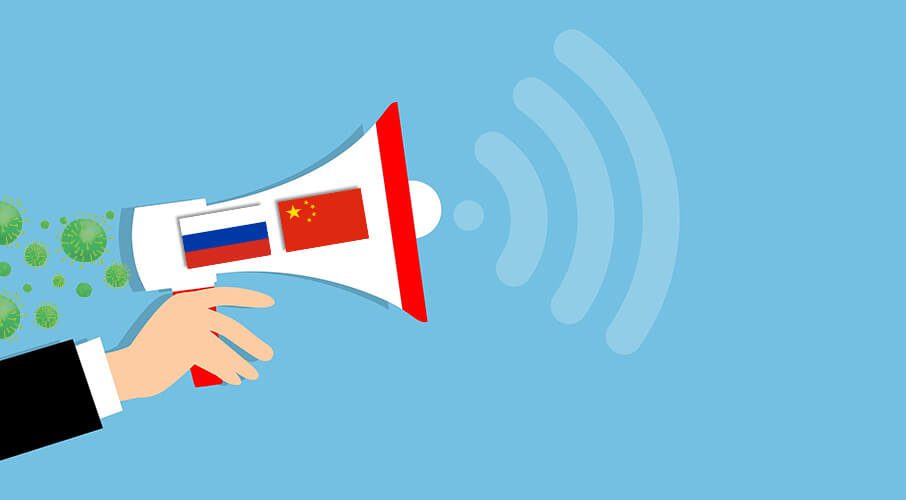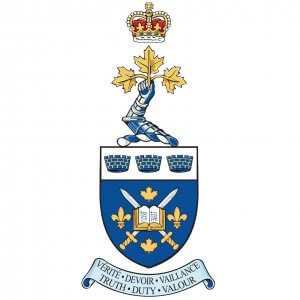 China and Russia are exploiting the pandemic to increase the spread of propaganda and disinformation domestically and abroad, write Pierre Jolicoeur and Anthony Seaboyer.
China and Russia are exploiting the pandemic to increase the spread of propaganda and disinformation domestically and abroad, write Pierre Jolicoeur and Anthony Seaboyer.
By Pierre Jolicoeur and Anthony Seaboyer, September 6, 2020
China and Russia’s leaders have openly weaponized the COVID-19 crisis for political gain and to advance their preexisting agendas. President Xi and President Putin have set their own personal interests of consolidating power and eradicating dissent over the health and even lives of their own citizens, and in the process losing what little soft power, based on reputation and trust, they may have had. Both countries show striking similarities in how they have weaponized COVID-19 in the information space to achieve political agendas.
This article offers a brief comparison of how both China and Russia – among other countries –weaponized the COVID-19 crisis for political gain by exploiting the crisis for propaganda campaigns towards other powers as well as using COVID-19 to justify a drastic increase in influence operations on their citizens.
From the beginning of the outbreak, first Beijing and later Moscow spread disinformation to hide cases and downplay the threat of the virus to their own citizens. China was aware of the human-to-human transmission of the virus as early as December 2019, but chose to hinder the spread of any information about COVID-19 and even denied its existence. Instead of sharing information about the virus with the WHO or even its own citizens, the regime arrested doctors who initially raised alarm about the illness, even as the cases of the new virus increased dramatically.
Russia has a similar strategy of hindering information flow about the virus in Russia. Three doctors “fell” from hospital windows in two weeks alone. One of the three doctors had become famous for posting a video online explaining how insufficient the hospital supplies of protective gear are and that he had been forced to continue working in the hospital as a doctor even after testing positive for COVID-19.
China and Russia are not only guilty of spreading disinformation domestically. They also use narratives related to the virus in their ongoing information operations against the West aimed at creating panic and intentional confusion about the virus. Chinese agents have, for example, spread text messages and social media posts that falsely claimed the US president was “locking down the country.” Russia’s COVID-19 disinformation campaigns are aimed at worsening the impact of COVID-19 in the EU, in order to generate panic, sow distrust in Western government institutions and create the impression that Russian and its authoritarian political system are better suited to deal with the crisis. They are even produced in English, French, German, Spanish and Italian languages in order to better target foreign audiences.
In order to generate goodwill, both China and Russia have offered assistance to other countries dealing with the viral outbreak, such as by exporting personal protective equipment (PPE) for frontline medical workers. Media coverage of their generosity was then exploited to support ongoing propaganda campaigns claiming that either China or Russia had to come to the help of the West in the absence of EU or NATO support on this issue. At times China but certainly Russia needed the PPE resources for themselves but propaganda victories were prioritized over the health of their own citizens.
Counter to Russian and Chinese narratives, the EU has actually invested considerably in helping its member states. Individual EU member states have also been very effective in helping each other cope with the virus; for example, when Germany flew ICU patients from Italy, France and Spain to German hospitals for treatment. At the same time, both China and Russia spread the false narrative that democracies are too weak to save the lives of their citizens and only “strong countries” like Russia and China are able to deal with the virus. Ironically, Russia is one of the countries in the world that is currently experiencing the fastest growth of its epidemic.
Similar approaches have also been introduced to reduce the flow of “unauthorized” information by – even more strictly than before – trying to censor any critical citizen commentary of the response to the virus or even the threat the virus poses. Russian and Chinese testing, at least initially, was denied to citizens in an effort to statistically keep the number of affected people low; this was done to create the impression of health care systems sufficiently equipped to deal with the crisis, in contrast to how they described Western democracies dealing with the crisis.
Both countries are suspected (for good reason) to have drastically under-reported both domestic cases COVID-19 infections as well as related deaths. China has gone even as far as to ban online gaming with foreigners as well as chatting online with foreigners in an effort to reduce the spread of information. Both countries have also introduced sweeping surveillance measures on communication and gatherings in which protest against insufficient health care resources to fight COVID-19 and related measures could be expressed. Russian citizens are required to apply online if they want to travel more than 100 meters away from their door step. China had famously quarantined whole cities, enforced compliance with drones and even physically looked doors to apartment buildings with infected citizens.
The similarities in the approaches of both China and Russia are striking. The leadership of both countries are exploiting the pandemic to increase the spread of propaganda and disinformation domestically and abroad, crushing dissent and normalizing a range of extreme surveillance measures to control their citizens by tracking and restricting their movements – measures being watched with great interest by authoritarian leaders in an increasing number of countries.
Pierre Jolicoeur is professor of Political Science at the Royal Military College of Canada (RMC) and teaches International relations and Russian Foreign Policy.
Anthony Seaboyer is Director of the Centre for Security, Armed Forces and Society at RMC and teaches Political Science and Political Philosophy.
 This contribution is part of a 14-articles report on the global politics of the COVID-19 crisis. The report was published by the new Centre for Security and Crisis Governance (CRITIC). Part of the Royal Military College Saint-Jean, CRITIC’s mission is to produce state-of-the-art and policy relevant research pertinent to global security policy and crisis management. It will be officially inaugurated in September 2020.
This contribution is part of a 14-articles report on the global politics of the COVID-19 crisis. The report was published by the new Centre for Security and Crisis Governance (CRITIC). Part of the Royal Military College Saint-Jean, CRITIC’s mission is to produce state-of-the-art and policy relevant research pertinent to global security policy and crisis management. It will be officially inaugurated in September 2020.
For more information about CRITIC, please contact director Bruno Charbonneau at bruno.charbonneau@cmrsj-rmcsj.ca.




